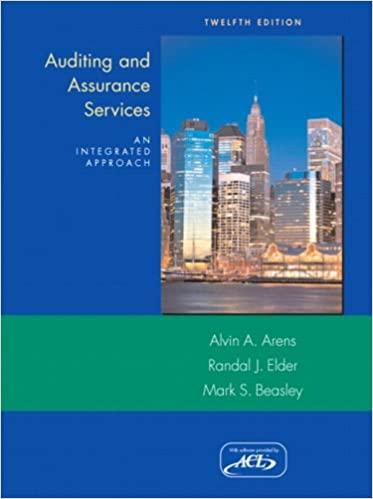

8-39 (OBJECTIVES 8-2, 8-3) Winston Black was an audit partnerin the firm of Henson, Davis & Company. He was in the process of reviewing the audit files for the audit of a new client, McMullan Resources. McMullan was in the business of heavy construction. Black was conducting his first review after the audit was substantially complete. Normally, he would have done an initial review during the planning phase as required by his firm's policies; however, he had been over whelmed by an emergency with his largest and most important client. He rationalized not reviewing audit planning information because (1) the audit was being overseen by Sarah Beale, a manager in whom he had confidence, and (2) he could "recover" from any prob- lems during his end-of-audit review. Now Black found that he was confronted with a couple of problems. First, he found that the firm may have accepted McMullan without complying with its new-client accep tance procedures. McMullan came to Henson, Davis & Company on a recommendation from a friend of Black's. Black got "credit" for the new business, which was important to him because it would affect his compensation from the firm. Because Black was busy, he told Beale to conduct a new-client acceptance review and let him know if there were an problems. He never heard from Beale and assumed everything was okay. In reviewing Beale's preaudit planning documentation, he saw a check mark in the box "Contact prion auditors but found no details indicating what was done. When he asked Beale about this she responded with the following I called Gardner Smith [the responsible partner with McMullan's prior audit firm] and left a voicemail message for him. He never returned my call. I talked to Ted McMullan about the change, and he told me that he informed Gardner about the change and Ican. Ted said Gardner sent over copies of analyses of fixed assets and equity accounts, which Ted gave to me. I asked Ted why they replaced Gardner's firm, and he told me it was over the tax contingency issue and that Gardner said, Fine, I'll help in any way the size of their fee. Other than that, Ted said the relationship was fine The tax contingency issue that Beale referred to was a situation in which McMullan had entered into litigation with a bank from which it had received a loan. The result of the litigation was that the bank forgave several hundred thousand dollars in debt. This DIT PROCESS was a windfall to McMullan, and they recorded it as a gain, taking the position that it was position and insisted that a contingent tax liability existed that required disclosure. This upset McMullan, but the company agreed in order to receive an unmodified opinion. Before hiring Henson, Davis & Company as their new auditors, McMullan requested that the firm review the situation. Henson, Davis & Company believed the contingency was remote and agreed to the elimination of the dis- nontaxable . The prior auditors disputed this closure The second problem involved a long-term contract with a customer in Montreal. Under accounting standards, McMullan was required to recognize income on this contradt using the percentage-of-completion method. The contract was partially completed as of year-end and had a material effect on the financial statements. When Black went to review the copy ofthe contract in the audit files, he found three things. First, there was a contract summary that set out its major feat ures. Second, there was a copy of the contract written in French. Third, there was a signed confirmation confirming the terms and status of the contract. The space requesting information about any contract disputes was left blank, indicating no such problems. Black's concern about the contract was that to recognize income in accordance with accounting standards, the contract had to be enforceable. Often, contracts contain a cancellation clause that might mitigate enforceability. Because he was not able to read French, Black couldn't tell whether the contract contained such a clause. When he asked Beale about this, she responded that she had asked the company's vice president for the Canadian division about the contract and he told her that it was their standard contract. The company's standard contract did have a cancellation clause in it, but it required mutual agreement and could not be cancelled unilaterally by the buyer a. Evaluate and discuss whether Henson, Davis & Company complied with auditing standards in their acceptance of McMullan Resources as a new client. What can they Required do at this point in the engagement to resolve deficiencies if they exist? McMullan's Montreal contract. If not, what more should be done? with auditing standards. b. Evaluate and discuss whether sufficient audit work has been done with regard to c. Evaluate and discuss whether Black and Beale conducted themselves in accordance








